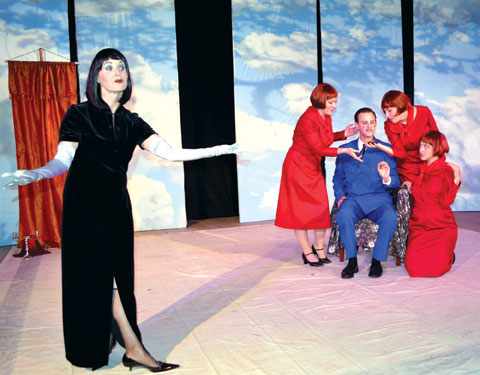
CECI N'EST PAS UNE PLAY It is much larger and deeper, indeed. |
The stirrling billing for the original play Aquitania is "Alice in Wonderland meets Magritte." That turns out to be a very apt description for this delicious theatrical elixir staged by the Ziggurat Theatre Ensemble, which beautifully restores a sense of fantasy, mystery, and the absurd to us grown-ups. Written and directed by Stephen Legawiec, artistic director of Ziggurat (which recently relocated from Los Angeles), the distinctive, gorgeously produced, and scintillatingly performed Aquitania should not be missed.
Like Alice, Aquitania opens with a small girl (the enchanting Fern Beede, who alternates with Lilly Victoria Gardiner); she is playing a chess-like game with oversized wooden pieces, coached by a mustachioed man called Malagigi (Legawiec). We'll slowly unravel the girl's connection with our protagonist, Marguerite (Astrea Campbell-Cobb), a sort of grown-up, post-rabbit-hole Alice: a shy, no-nonsense 1930s librarian wearing glasses and high-collared ivory. Marguerite has been mysteriously summoned by the king of the mountainous and liberal-minded seaside land of Aquitania, where she's received by his nephew Roland (Michael Dix Thomas) and Roland's consort Fleurdelis (Rachel Kodweis), enthusiastic high-society ingénues in cobalt blue. They reveal that the evil Gano (Caleb Lacy) has seized the mountain site of a legendary Aquitanian armory; Marguerite has been called to regain the mountain and so save Aquitania, much to her own bewilderment. But the whimsical Aquitanians need her practicality — just as Marguerite, it turns out, might need a dose of their magic.
The Alice absurdities and whimsies meet those of Magritte in Aquitania's dazzling, stylized production design: At the back of the stage stand six tall, gold-edged panels of the artist's quintessential blue and pillowy-white sky (Dorothy Royle's paintings), and much of the costuming and set dressing — Gano's bowler hat and black suit; Malagigi's mustache; Marguerite's pale, fitted shirt and skirt; even the wooden chess pieces — are direct allusions to his paintings. The dramatic low horns of a noir detective film punctuate dramatic moments, and the production in general conjures a coyly seductive essence of jazz-age France, particularly in the three "Aquitanians": a chorus of three exquisite chanteuses in short red dresses and red bobs (the divinely dulcet Carolyn Glaude, Zoe Raphael, and Melody Stolpp), whose singing — in French, Latin, and English — is both mellifluous and witty.
This ambrosia of stylized wit and fantasia is sustained throughout Aquitania's narrative, direction and performances. When the black-velvet garbed witch Ilaska (Dana Wieluns Legawiec) is first found hiding, she's voguing under a wine-colored lampshade. Each time she diverts a good guy with her magical cake, the victim begins helplessly grooving to the chorus's French pop get-it-on chanson. Fleurdelis is a dead ringer for Marilyn Monroe, and like everyone in Aquitania, she and Roland are constantly striking poses. Cockney secret-keeper Fobliar (Jacob Cote) has enormous fun with groundling comedy and a furry fish; court elder Bradamante (Kathleen L. Nation) weaves a tale of a magic ring as the chorus intones a chorale. The cast is magnificent, and Legawiec's blocking of all of them is beautifully conceived and executed, a series of shift-changing tableaux drawn with both painterly precision and a mime's sense of physical comedy and the absurd.